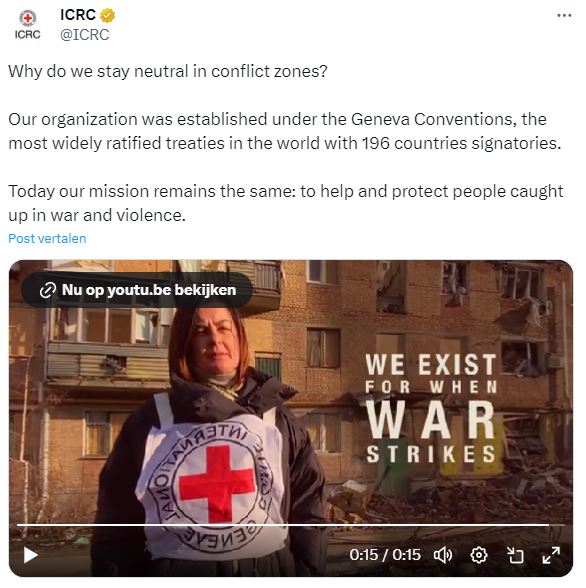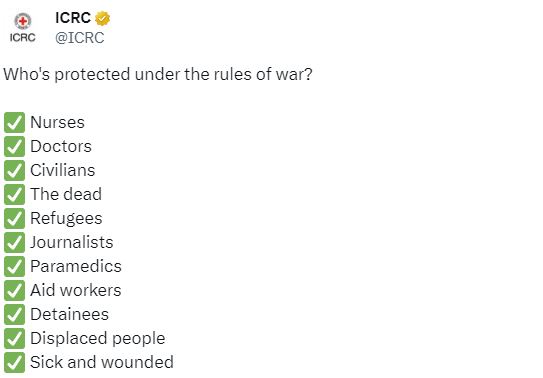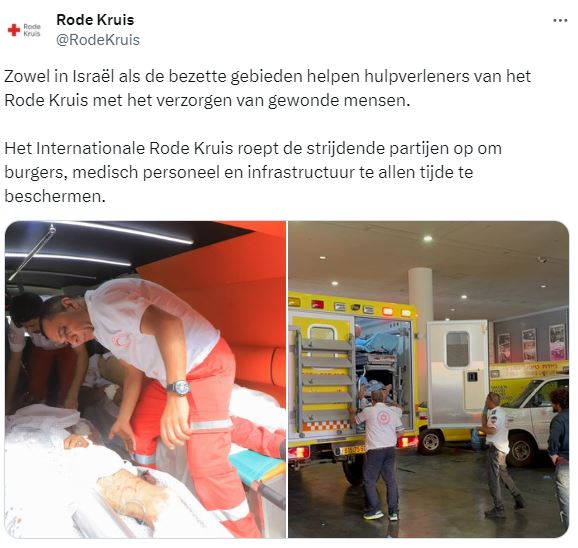Seven questions about staying neutral during a war
Have you noticed it too: you see images on TV of terrible violence during a war, and then you hear that the international Red Cross and Red Crescent Movement visit the leaders of the warring parties. Why do you keep talking to everyone? And why do you never call parties to account? To these (and five other) understandable questions, we provide understandable answers.
© Red Cross
1. Sometimes it is abundantly clear that an army or other armed group is doing very nasty things. So why doesn't the International Red Cross and Red Crescent Movement take sides?
The International Red Cross and Red Crescent Movement always remains neutral during conflict. We do this because, first and foremost, we want to help people. We help everyone who needs help, it does not matter to us what your nationality, religion or political affiliation is. So we are impartial.
We can only help people during war if we ourselves are not attacked. That is why we have never taken sides since our founding. Warring factions around the world know that, and that's why they let us in to provide aid. They wouldn't do that if they thought we were supporting their enemy.
In addition, we remain neutral because we want to remain in conversation with all warring parties. Chances are that a country or group will not want to talk to us if we speak out against them.
2. If people are attacking each other with bombs and guns, then engaging in conversation no longer matters at all, does it?
Especially when there's a lot of violence, it's enormously important that we talk to everyone involved. We do this at a high diplomatic level, but also with local authorities, and everything in between. In such a conversation, we try to achieve three things:
We remind parties of their obligations to abide by humanitarian law of war. That is a set of rules that apply during a conflict. The purpose of those rules is to prevent as much suffering as possible. The International Red Cross and Red Crescent Movement is the protector of humanitarian law of war and thus brings war rules to the attention of the world.
We call on parties to protect civilians.
We want parties to give us safe access to the conflict area so we can help people.
3. It remains strange: the international Red Cross and Red Crescent Movement is protector of humanitarian law of war, but when a party breaks the rules, you think nothing of it?
We believe everyone should abide by humanitarian law of war. But a court or criminal court judges whether a party has broken the rules, not the International Red Cross and Red Crescent Movement. Determining whether war crimes have been committed requires careful investigation. This can sometimes take years. This investigation is done by specialists. That is not our role.
However, the International Red Cross and Red Crescent Movement is there to help people as quickly as possible. We can do that by staying in conversation. Above all, we try to convince parties not to make any more mistakes. That way we can prevent further suffering.
4. What can an aid organization still do when entire cities are being bombed?
Especially when there is heavy fighting in an area, help from a neutral organization can save lives. For example, what we do:
-
We provide medical assistance to victims of the violence.
-
We bring food and water into an area.
-
We help people get out of an area.
-
We investigate whether people are treated humanely, for example by visiting prisoners of war.
-
We shelter people who have fled from an area.
We can provide this help only if all warring parties allow us to do so. This is why it is so important that we remain neutral.
5. Then why do I hear that you are not present in some conflict areas? Isn't it your responsibility to help people in need?
The party in control of an area must ensure that civilians there are safe and that they have enough food. Such a party may allow the international Red Cross and Red Crescent Movement access to the area, for example, to distribute food and drink. But it is still that party's responsibility to ensure that the population has the means to survive.
6. Is it true, then, that the International Red Cross and Red Crescent Movement help everyone? Even people who are fighting?
We help anyone who needs help during a conflict, no matter what the reason. Furthermore, it is good to know that people are by no means always left behind to fight. For example, we see in Ukraine and in Armenia/Azerbaijan that many elderly and vulnerable people were also left behind in besieged areas, for example, because they could not get away or because they had no place to go.
7. Sometimes you hear about people being forced to evacuate, does the international Red Cross and Red Crescent Movement help with that?
No. We help evacuate, but only if people want to do so themselves. That applies to all emergencies. So if the first floor of your grandmother's house floods and your grandmother refuses to leave, we won't force her to leave either.
By the way, warring parties are also not allowed to evacuate people against their will, but in practice that can happen. Then when people arrive in another country and they need help there, we are there to give help. Because we are always there when people need help, no matter where or why.



